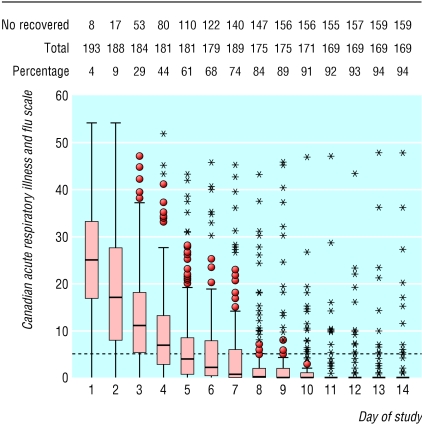Promoting self care for children with acute viral illness is an opportunity for relieving pressure on primary care. Carers may return for a second consultation and expect antibiotic treatment if they are not given a clear idea of what to expect or if their child fails to recover as predicted.1 We therefore set out to describe the clinical course of suspected acute viral infection of the upper respiratory tract in children who consult their general practitioner. We wanted to help clinicians to better predict the course of the condition.
Participants, methods, and results
We did a secondary analysis of a cohort from a randomised controlled trial.2 All carers gave written consent, and older children signed a consent form when recruiting clinicians felt this was appropriate. Fifty five general practitioners in south Wales opportunistically recruited children aged between 6 months and 12 years during routine consultations into a trial of treatment for suspected acute viral infection of the upper respiratory tract. This was an acute illness affecting the upper respiratory tract probably caused, in the clinician's opinion, by a virus. Clinicians excluded children to whom they prescribed antibiotics at the initial consultation. Clinicians compared intranasal treatment with sodium cromoglicate with intranasal saline in a triple blinded manner. Because children treated with intranasal sodium cromoglicate effectively had the same clinical and statistical outcomes as children treated with intranasal saline, we examined data about the clinical course of the condition for the children as a single cohort.
Of the 290 recruited children, 137 (47%) were boys, the mean age was 5.2 (SD 3.39), and mean duration of illness at the time of consultation was 3.3 (2.18) days. Caregivers completed a daily diary of symptoms for up to 14 days which incorporated the 18 item Canadian acute respiratory illness and flu scale.3 This scale scores from 0 to 54, and higher scores indicate sicker children. Four of the items on the scale relate directly to the upper respiratory tract—for example, nasal congestion and sore throat—the remainder assess general symptoms of acute infection—for example, irritability and poor appetite. We considered children who scored ≤ 5 to have recovered. On the fourth day of the study, 101 (56%) of the children had not recovered. On the seventh day, 49 (26%) had not recovered, and, by the 14th day, 10 (6%) had not recovered (figure). Children who had not recovered by the 14th day had remained unwell; their illness did not follow a clinical course with two phases.
Figure 1.
Children's illness over two weeks after consulting their general practitioner with suspected acute viral infection of the upper respiratory tract. Whiskers show largest and smallest non-outlying values; circles show children that are more than 1.5 interquartile ranges from the 25th or 75th centiles (outliers); asterisks show children more than 3 interquartile ranges from the 25th and 75th centiles (extremes); broken line shows score of ≤5 (recovered)
Comment
More than half of children with suspected acute viral infection of the upper respiratory tract are still unwell four days after their initial consultation, a quarter are still unwell after a week (about 10 days after the onset of the illness), and one in 20 is still unwell after two weeks. Despite this, doctors may tell carers that children will get better in a few days.1
Giving this information to carers may enable them to care for their child more effectively and reduce the need for additional consultations. Being told that a child may have a longer illness could increase requests for treatment, specifically antibiotics, and therefore clinicians must be confident in communicating potential benefits and risks of treatment. Alternatively, carers who know what to expect may not consult when their child's illness lasts for more than a few days.
Supplementary Material
 Full acknowledgments are on bmj.com
Full acknowledgments are on bmj.com
We thank the trial steering committee, the data monitoring and ethics committee, the caregivers and children who took part, and the clinicians who recruited the children. See bmj.com
Contributors: CCB conceived the study. CCB, PK, KH, and MR developed the protocol. CCB, HP, MR, PK, KH, and HH collected data, managed the study, and wrote and interpreted the report. KH led the analysis. SR helped write and interpret the report. CCB is guarantor.
Funding: Medical Research Council (G9900236). CCB had a fellowship from NHS Wales Research and Development for Health and Social Care.
Competing interests: None declared.
Ethical approval: Bro Taf, Gwent, and Iechyd Morgannwg local research ethics committees.
References
- 1.Stott NCH. Management and outcome of winter upper respiratory tract infections in children aged 0-9 years. BMJ 1979;i: 29-31. [DOI] [PMC free article] [PubMed] [Google Scholar]
- 2.Butler CC, Robling MR, Prout H, Hood K, Kinnersley P. Management of suspected acute viral upper respiratory tract infection in children with intranasal sodium cromoglicate: a randomised controlled trial. Lancet 2002;359: 2153-8. [DOI] [PubMed] [Google Scholar]
- 3.Jacobs B, Young NL, Dick PY, Ipp MM, Dutkowski R, Davies HD, et al. Canadian acute respiratory illness and flu scale (CARIFS): development of a valid measure for childhood respiratory infections. J Clin Epidemiol 2000;53: 793-9. [DOI] [PubMed] [Google Scholar]
Associated Data
This section collects any data citations, data availability statements, or supplementary materials included in this article.



